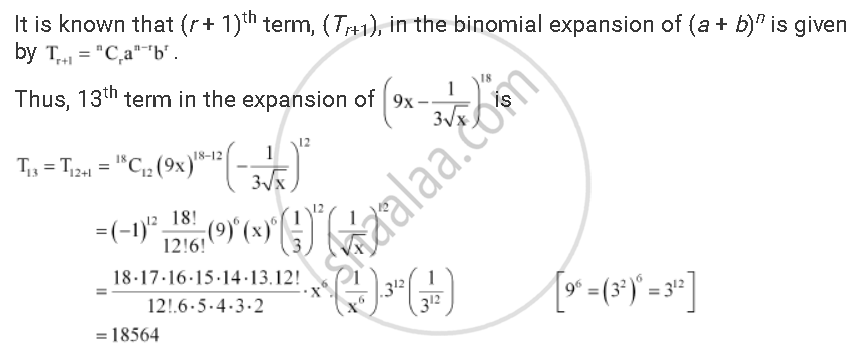Advertisements
Advertisements
प्रश्न
Find the 13th term in the expansion of `(9x - 1/(3sqrtx))^18 , x != 0`
उत्तर

APPEARS IN
संबंधित प्रश्न
The coefficients of the (r – 1)th, rth and (r + 1)th terms in the expansion of (x + 1)n are in the ratio 1:3:5. Find n and r.
Find a positive value of m for which the coefficient of x2 in the expansion
(1 + x)m is 6
Find n, if the ratio of the fifth term from the beginning to the fifth term from the end in the expansion of `(root4 2 + 1/ root4 3)^n " is " sqrt6 : 1`
Find the middle term in the expansion of:
(ii) \[\left( \frac{a}{x} + bx \right)^{12}\]
Find the middle terms in the expansion of:
(ii) \[\left( 2 x^2 - \frac{1}{x} \right)^7\]
Find the middle terms(s) in the expansion of:
(iii) \[\left( 1 + 3x + 3 x^2 + x^3 \right)^{2n}\]
Find the term independent of x in the expansion of the expression:
(vii) \[\left( \frac{1}{2} x^{1/3} + x^{- 1/5} \right)^8\]
Find the term independent of x in the expansion of the expression:
(x) \[\left( \frac{3}{2} x^2 - \frac{1}{3x} \right)^6\]
If the coefficients of \[\left( 2r + 4 \right)\text{ th and } \left( r - 2 \right)\] th terms in the expansion of \[\left( 1 + x \right)^{18}\] are equal, find r.
If the coefficients of (2r + 1)th term and (r + 2)th term in the expansion of (1 + x)43 are equal, find r.
Prove that the term independent of x in the expansion of \[\left( x + \frac{1}{x} \right)^{2n}\] is \[\frac{1 \cdot 3 \cdot 5 . . . \left( 2n - 1 \right)}{n!} . 2^n .\]
The coefficients of 5th, 6th and 7th terms in the expansion of (1 + x)n are in A.P., find n.
If in the expansion of (1 + x)n, the coefficients of pth and qth terms are equal, prove that p + q = n + 2, where \[p \neq q\]
In the expansion of (1 + x)n the binomial coefficients of three consecutive terms are respectively 220, 495 and 792, find the value of n.
If in the expansion of (1 + x)n, the coefficients of three consecutive terms are 56, 70 and 56, then find n and the position of the terms of these coefficients.
If 3rd, 4th 5th and 6th terms in the expansion of (x + a)n be respectively a, b, c and d, prove that `(b^2 - ac)/(c^2 - bd) = (5a)/(3c)`.
If a, b, c and d in any binomial expansion be the 6th, 7th, 8th and 9th terms respectively, then prove that \[\frac{b^2 - ac}{c^2 - bd} = \frac{4a}{3c}\].
If the 2nd, 3rd and 4th terms in the expansion of (x + a)n are 240, 720 and 1080 respectively, find x, a, n.
If the term free from x in the expansion of \[\left( \sqrt{x} - \frac{k}{x^2} \right)^{10}\] is 405, find the value of k.
Write the middle term in the expansion of `((2x^2)/3 + 3/(2x)^2)^10`.
Write the middle term in the expansion of \[\left( x + \frac{1}{x} \right)^{10}\]
Write the coefficient of the middle term in the expansion of \[\left( 1 + x \right)^{2n}\] .
If in the expansion of (1 + y)n, the coefficients of 5th, 6th and 7th terms are in A.P., then nis equal to
In the expansion of \[\left( \frac{1}{2} x^{1/3} + x^{- 1/5} \right)^8\] , the term independent of x is
If rth term is the middle term in the expansion of \[\left( x^2 - \frac{1}{2x} \right)^{20}\] then \[\left( r + 3 \right)^{th}\] term is
The number of terms with integral coefficients in the expansion of \[\left( {17}^{1/3} + {35}^{1/2} x \right)^{600}\] is
Find the middle term (terms) in the expansion of `(3x - x^3/6)^9`
Find the coefficient of `1/x^17` in the expansion of `(x^4 - 1/x^3)^15`
If p is a real number and if the middle term in the expansion of `(p/2 + 2)^8` is 1120, find p.
If xp occurs in the expansion of `(x^2 + 1/x)^(2n)`, prove that its coefficient is `(2n!)/(((4n - p)/3)!((2n + p)/3)!)`
Find the term independent of x in the expansion of (1 + x + 2x3) `(3/2 x^2 - 1/(3x))^9`
In the expansion of `(x^2 - 1/x^2)^16`, the value of constant term is ______.
Middle term in the expansion of (a3 + ba)28 is ______.
The position of the term independent of x in the expansion of `(sqrt(x/3) + 3/(2x^2))^10` is ______.
